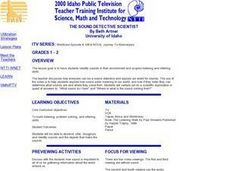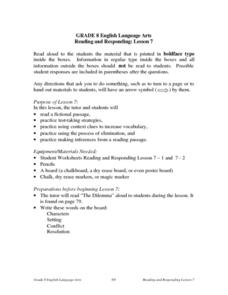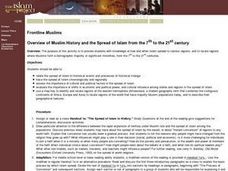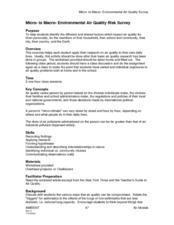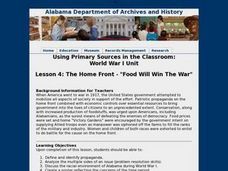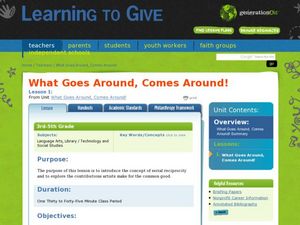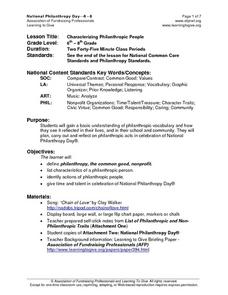Curated OER
the Sound Detective Scientist
Students identify sounds in their environment and acquire listening and inferring skills.
Curated OER
Reading and Responding -- Lesson 7
Fourth graders work individually or in a small group to (1) read a nonfictional selection, (2) identify main idea and details, (3) identify the author's purpose, and (4) practice test-taking strategies.
Curated OER
ABC's Of Figuring Interest
Students participate in a lesson of figuring interest. This is done in order to strengthen number calculation skills while computing the interest when buying different things. This done in conjunction with using credit to make purchases...
Curated OER
Frontline Muslims: Overview of Muslim History and the Spread of Islam from the 7th to the 21st century
Students gain insight into how and when Islam was spread to various regions from the 7th century to today. They are able to identify and asses the importance of cultural and political factors in the spread of Islam and the effect it has...
Curated OER
Micro- To Macro- Environmental Air Quality Risk Survey
High schoolers research the importance of air quality. In groups, students explore factors leading to poor air quality and methods of minimizing air pollution. Given a diagram of concentric circles, high schoolers survey their personal...
Curated OER
Pedal Triangles
Pupils identify the properties and theorems of triangles. In this geometry lesson, students construct angle bisectors using a compass and straight edge. They identify triangular similarity and congruency.
Curated OER
ABBA - Lesson 2
Students identify and notate the musical device known as a "hook". They notate and perform rhythmic and melodic patterns in the ABBA song "Mamma Mia".
Curated OER
Artifacts: Bringing the Past Back to Life -- the Mexican Case
Students examine and discuss the meanings of the various symbols in Tenochtitlan. In groups, they complete a part of the model of the city and discuss the importance of finding artifacts. Individually, they choose an a two-dimensional...
Curated OER
Who Do You See?
Students analyze portraits and decide on the most important aspects of their own personality. In this portraiture lesson, students identify feelings and emotions in the sitter and the creator of a portrait. After reading the poem "We...
Curated OER
Christmas at Mud Flat Lesson Plan
Young scholars analyze the characters in the book Christmas at Mud Flat. In this early childhood lesson plan, students analyze characters in the book, then choose which character they personally identify with the most. Young scholars...
Curated OER
Why Come To America?
Eighth graders investigate reasons large numbers of people immigrated to the U.S. They identify hardships and risks involved in coming to America and identify the affects immigration has had on the traditions and cultures in the...
Curated OER
The Home Front - "Food Will Win The War"
Students define and identify propaganda. They analyze the multiple sides of an issue (problem resolution skills), then discuss the racial environment of Alabama during World War I. They reate a poster reflecting the concerns of the time...
Curated OER
Biographies of Heroes
Second graders explain the importance of individual action and character. They explain how heroes from long ago and the recent past make a difference in others' lives.
Curated OER
Heart Disease Prevention
Fourth graders get into groups and brainstorm ways to obtain physical activity and different healthy foods to eat. They then develop and write and individual plan for healthy living and commit to enforcing their plan for a minimum of one...
Curated OER
Sequence of Events
Third graders discuss the importance of putting events into the correct sequence. In groups, they put the order of events of different stories into the correct order while completing a worksheet. To end the lesson, they identify the...
Curated OER
Personal Hygiene Regimen
Students identify and describe the importance of maintaining good personal hygiene. Individual students write a paragraph describing their personal hygiene regimen. Products used for personal hygiene are identified. This lesson is...
Curated OER
Photosynthesis
Fourth graders discuss and identify the components of photosynthesis and the products of this process. They participate in a class discussion about the importance of oxygen, and in small groups act out the process of photosynthesis. ...
Curated OER
Bill of Rights: Rights and Responsibilities
Students explore the Bill of Rights. In this U.S. Constitution instructional activity, students consider the individual liberties outlined in the Bill of Rights as they read the provided handouts and complete the provided worksheet...
Curated OER
What Motivates You at Work?
In this work motivators worksheet, students are given a list of ten common motivators. Students rank the work motivators in order of importance to them.
Curated OER
What Goes Around, Comes Around!: Art from the Heart
Young scholars identify the relationship between an artist and their community. In this serial reciprocity lesson, students listen to a story called Camille and the Sunflowers by Laurence Anholt and discuss how the community helped...
Curated OER
Mapping the Civil War
Students identify the locations of pivotal American Civil War battles. In this map skills lesson plan, students label Fort Sumter, Antietam, Vicksburg, Gettysburg, and the Battle for Atlanta on an outline map. The map is not included.
Curated OER
Self-Portrait Shields
Students listen to the story, The Shield of Athena, and examine the original context of the sculptural fragment of a fallen warrior. They list important events and people in their lives, then create shields that depict their personal...
Curated OER
Lesson One: Characterizing Philanthropic People
Familiarize your class with philanthropy and involve individuals in philanthropic activities. First, determine the traits of philanthropic people. Class members attach sticky notes with character traits written on them to each side of at...
Curated OER
Political Polling
Students examine the roll of polling in elections and assess information provided by polls. They define the term survey. Pupils conduct a poll, individually each student answers the questions, as a group, tally the results. Students...
